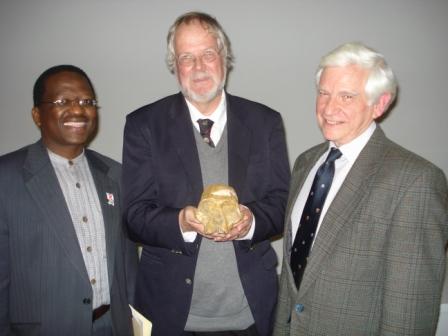
Rhodes recently hosted an array of distinguished palaeontologists as part of the Royal Society of South Africa’s annual Robert Broom Colloquium.
Scientists from around the country including Johannesburg, Graaff-Reinet, Kenton and Port Alfred made the trip to be part of the event, which involved a series of palaeontology lectures presented in memory of Professor Broom, an eminent South African palaeontologist, paleoanthropologist and medical doctor.
The late Prof Broom, who studied medicine at the University of Glasgow in the early 1900s before realising his passion for palaeontology, is heralded as an outstanding South African scientist for his study of mammal-like reptiles. Prof Broom is known for his invaluable fossil discoveries in Sterkfontein, Kromdraai and Swartkrans, and for his discovery of Mrs Ples.
In his speech, “A legend in his time – Broom’s mentorship in understanding mammal origins,” Professor Bruce Rubidge, Director of the Bernard Price Institute of Palaeontology at Wits University, described Prof Broom as having changed the face of palaeontology in South Africa.
Prof Broom discovered 369 new species of mammalian reptiles, of which 210 continue to be valid; a feat which Prof Rubidge said deserves the utmost acknowledgement. “This is an incredible achievement given that he didn’t have the huge advantage of technology that we have to help us in our work today. Prof Broom established the groundwork; we’ve added technology. He also discovered the pathway from reptiles to mammals, an incredible achievement,” he said.
Dr Rose Prevec, Research Associate at the Albany Museum and one of only two palaeobotanists in South Africa, delivered an address, “Exploring ancient forests of the Karoo – new perspectives in an old science”, in which she considered possible causes for the Permian-Triassic mass extinction event, commonly known as the Great Dying, of 251.4 million years ago. Known as the earth’s most severe extinction event and the only known mass extinction of insects, it saw up to 96% of all marine species and 70% of terrestrial vertebrate species becoming extinct.
Of the various possible explanations for the event, Dr Prevec said she believes environmental and climate change to have been causal factors. “If you think about what we are doing to the earth today you can see it’s not much different than what was going on then, which led to disaster. Today we’re burning up plants for coal, releasing carbon dioxide and fly ash into the atmosphere, to what end?”
Dr Adam Yates, also of the Bernard Price Institute of Palaeontology shared developments in his research into invertebrate and trace fossils, with a special focus on The Karoo basin and the rise of dinosaurs”. In describing their effects on the environment, Dr Yates said we have never before seen such total ecological dominance as with the period of the dinosaurs. “It was unprecedented; they had complete control over terrestrial niches,” he said.
Having conducted much of his research in the highlands of Lesotho and the foothills of the Drakensberg, Dr Yates said South Africa has some of the best rocks in the world for this kind of paleontological research.
Dr James Brink of the National Museum in Bloemfontein spoke about “The Evolution and origin of modern large animal faunas in southern Africa”, and highlighted the theme of aridity as being of central importance to the development of African mammals. Through his study of the palaeo-temperature curve over millions of years to gauge global temperature changes, Dr Brink said he has come to learn how central temperature is in affecting evolution.
The colloquium concluded with the 2011 Amy Jacot-Guillarmod lecture that was delivered by Professor Francis Thackeray, Director of the Institute for Human Evolution at Wits. In his speech, entitled “Human evolution, climate and statistics”, Prof Thackeray highlighted the need to consider a new concept of “species”, and not to remain entrenched in the belief of clear boundaries between species.
“The problem is how to define a species, but I want to think about this in terms of following from Darwin’s view of difference,” he said.
Story and photo by Sarah-Jane Bradfield
Photo: Dr Sizwe Mabizela, Deputy Vice-Chancellor of Rhodes University, Professor Francis Thackeray, Director of the Institute for Human Evolution at Wits University and Prof Perry Kaye, Chairman of the Committee of the Eastern Cape branch of the Royal Society of South Africa.
